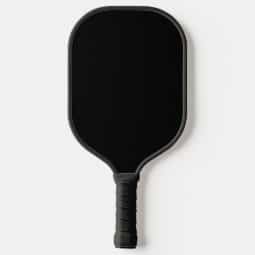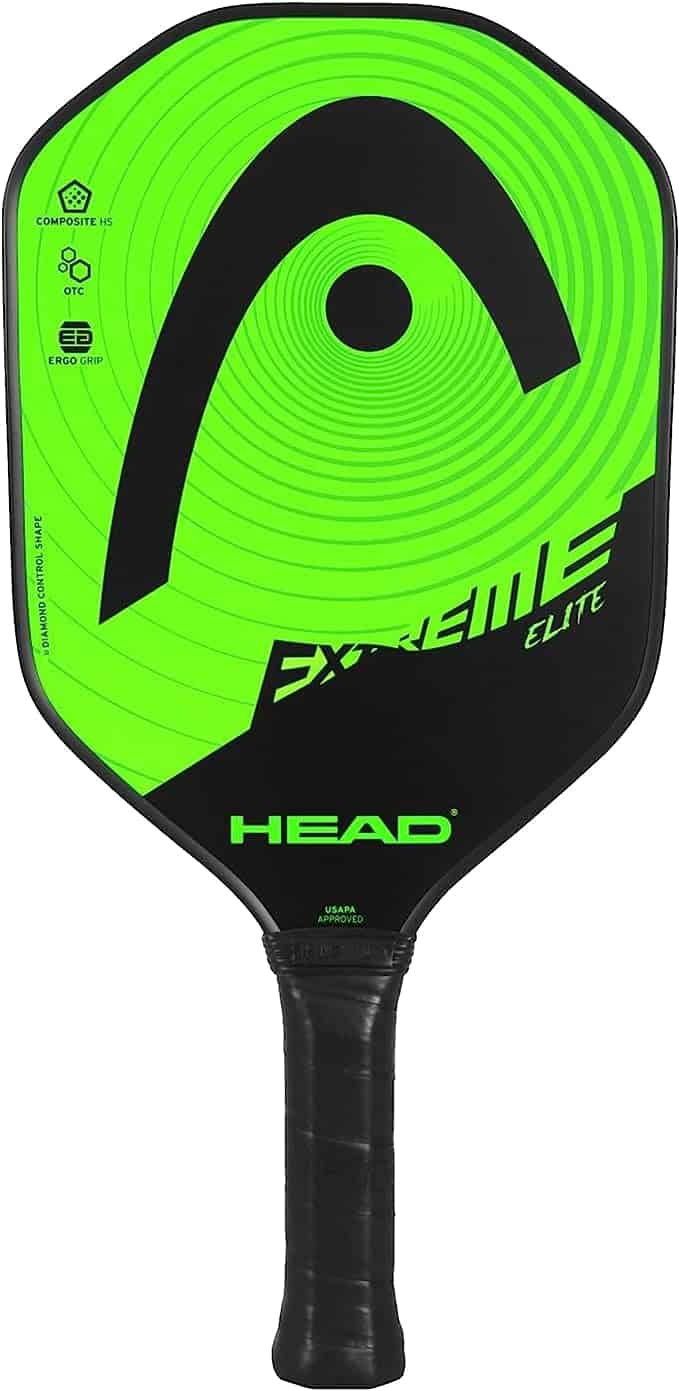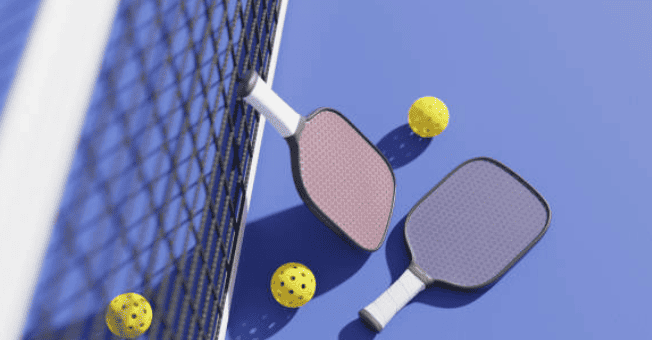Top 4 Lightest Pickleball Paddles: Up Your Speed and Maneuverability
Does a lightweight pickleball paddle matter? What are the lightest pickleball paddles? Does paddle shape matter? Your paddle choice directly impacts your game. One of the key factors to consider when choosing a pickleball paddle is its weight.
Lighter paddles can provide greater control and finesse, allowing players to place shots more accurately. In this article, I will be discussing the lightest pickleball paddles currently available on the market.
There are several factors to consider when choosing the lightest pickleball paddle for your game. Some of the most important factors include the paddle’s weight, balance, and construction. The lightest paddles typically weigh between 6.5 and 7.2 ounces, making them easy to maneuver and control.
Additionally, paddles with a balanced weight distribution can help players maintain control and accuracy during gameplay. Finally, the construction of the paddle can impact its overall performance, with materials like carbon fiber and fiberglass providing a lightweight yet durable option.
In the following post, I will be discussing some of the best options for the lightest pickleball paddles on the market based on my research and personal experience.

Understanding Pickleball Paddles
As a pickleball player, choosing the right paddle is crucial to your performance on the court. Understanding the different aspects of a pickleball paddle can help you make an informed decision when selecting a paddle that suits your playing style.
Paddle Material For Lightest Pickleball Paddles
Pickleball paddles come in different materials, including carbon fiber, graphite face, aluminum honeycomb core, and polymer honeycomb. Each material has its own unique characteristics that affect the paddle’s weight, durability, and performance.
Carbon fiber and graphite paddles are lightweight and provide excellent control, while aluminum and polymer honeycomb paddles are more durable and provide power. We will cover which materials the lightest pickleball paddles use in their construction.
Paddle Face Materials Comparison
| Material | Characteristics | Common Use |
|---|---|---|
| Graphite | – Very strong and lightweight material – Provides good balance of power & control – Very Durable | High-performance paddles |
| Composite | – Often has a rougher texture – referred to as fiberglass | Favored for spin generation |
| Carbon fiber | – Used for the surface of spin-centric paddles – High friction properties | Spin-centric paddles; lighter than graphite |
Paddle Core Materials Comparison
| Material | Characteristics | Common Use |
|---|---|---|
| Polymer | – Softest and quietest material – Excellent power with less noise | Heavier paddles |
| Nomex | – Hard, durable, and powerful material – Created by dipping a honeycomb framework into a resin | Lightweight paddles |
| Aluminum | – Offers a blend of power and control – Usually light but less powerful than Nomex | Lightweight paddles |
Paddle Size and Shape
Pickleball paddles come in different sizes and shapes, with elongated and rounded shapes being the most common. The paddle’s size and shape affect the player’s reach, power, and control. A longer paddle provides more reach, power, and spin, while a shorter paddle provides more control. Any of these shapes can be used for a lightweight pickleball paddle.
Paddle Weight
Paddle weight is a crucial factor to consider when selecting a pickleball paddle.
A lightweight paddle, typically weighing less than 7.5 ounces, is ideal for players who want to maximize their speed and agility on the court.
A reduced-weight paddle allows players to move and swing with greater speed and agility.
A midweight pickleball paddle is suitable for players who want a balance between power and control.
A heavier pickleball paddle is ideal for players who want more power and stability.
| Weight Range | Power | Spin | Control | Agility |
|---|---|---|---|---|
| Lightweight (7-7.3 ounces) | Best for agility and control | Good for spin | Good for touch shots | Beginner Intermediate 50+ Women Doubles Play |
| Midweight (7.3-8.3 ounces) | Good balance of power and control | Good for all-around play | Good for volleys | Versatile |
| Heavyweight (8.3-10 ounces) | Best for power | Good for blocking | Less forgiving on mis-hits | Singles Beginner Intermediate Advanced |
| Extra Heavy (10-13 ounces) | Maximum power | Not as good for spin or control | Very unforgiving on mis-hits | Advanced |
In conclusion, understanding the different aspects of a pickleball paddle, including the material, size and shape, and weight, can help you select a paddle that suits your playing style and maximizes your performance on the court.
Benefits of A Lightweight Pickleball Paddle
As a pickleball player, I have found that using a lightweight paddle has several benefits. Here are some of the advantages of using a lightweight pickleball paddle:
Increased Speed and Maneuverability
One of the greatest pluses of a lightweight pickleball paddle is that it allows for much greater speed and maneuverability at the net and on the court. With less weight to move, I can react more quickly to incoming shots, change direction more easily, and make more precise adjustments to my paddle angle and speed.
Improved Finesse and Control
A lightweight pickleball paddle provides me with improved finesse and control. I can make more precise shots with a lightweight paddle, which is especially important during close-net play. The reduced weight also allows me to have a larger sweet spot, making it easier to hit the ball in the center of the paddle.
Reduced Fatigue
Using a lightweight paddle reduces arm fatigue, allowing me to play longer and more intense games. This is especially beneficial for seniors or players with shoulder and arm injuries such as tennis elbow.
Enhanced Speed and Agility
A lightweight paddle increases the speed of my shots and serves, allowing me to dominate the court. It also enhances my agility, allowing me to move quickly and efficiently around the court.
In conclusion, using a lightweight pickleball paddle has several benefits, including increased speed and maneuverability, improved finesse and control, reduced fatigue, and enhanced speed and agility.
Drawbacks of Lightweight Pickleball Paddles
As someone who has played pickleball for many years, I have tried out a variety of paddles, including lightweight ones. While there are certainly benefits to using a lighter paddle, there are also some drawbacks that players should be aware of before making a purchase.
One of the main drawbacks of a lightweight pickleball paddle is that it may not provide as much power as a heavier paddle. While a lighter paddle may be easier to maneuver, it may not be able to generate as much force when hitting the ball. This can be a disadvantage for players who rely on power shots to win points.
Another potential drawback of a lightweight paddle is that it may not be as durable as a heavier paddle. Lightweight pickleball paddles are often made with thinner materials in order to reduce weight, which can make them more susceptible to damage from impacts or wear and tear over time.
In addition, some players may find that a lightweight paddle does not provide as much stability or control as a heavier paddle. A lighter paddle may be more prone to twisting or turning during a shot, which can make it difficult to hit the ball accurately.
Finally, it’s worth noting that a lightweight paddle may not be the best choice for players who are prone to arm or shoulder injuries. A lighter paddle may be easier to swing, but it may also require more effort to generate power, which can put additional strain on the arm and shoulder muscles.
Overall, while there are certainly benefits to using a lightweight pickleball paddle, it’s important for players to consider the potential drawbacks before making a purchase. Depending on your playing style and physical abilities, a heavier paddle may be a better choice in terms of power, durability, and control.
Choosing the Right Paddle
As a pickleball player, choosing the right paddle is crucial for your performance on the court. There are several factors to consider when selecting a paddle, including grip size and material, performance and playing styles, and price considerations.
Grip Size and Material
The grip is an essential aspect of a pickleball paddle as it determines how well you can hold and control the paddle during the game. The grip size typically ranges between 4″ and 5″, with a standard grip size of 4″ for most paddles. However, if you have larger or smaller hands, you may need to consider a larger or smaller grip size.
Additionally, the grip material is also essential as it determines the level of comfort and secure grip you have on the paddle. Some common grip materials include rubber, synthetic, and leather. Rubber grips are the most popular as they provide a comfortable and secure grip, while synthetic and leather grips offer more durability.
Performance and Playing Styles
When choosing a pickleball paddle, you should consider your playing style and the type of shots you use. If you prefer a more aggressive playing style with hard shots and spins, you should choose a paddle with a heavier weight and a larger sweet spot. A lightweight paddle is ideal for players who has a more defensive playing style with precise ball control.
The wrist action is also crucial when selecting a paddle, as it determines how well you can command the paddle during the game. If you have a weak wrist, you should choose a lighter paddle that allows for better wrist action.
Price Considerations
Price is also an essential factor to consider when choosing a pickleball paddle. Paddles can range from $20 to over $200, depending on the brand, material, and performance features. While it may be tempting to choose a cheaper paddle, investing in a high-quality paddle can significantly improve your performance on the court.
In conclusion, choosing the right pickleball paddle is crucial for your performance on the court. By considering grip size and material, performance and playing styles, and price considerations, you can find the perfect paddle that suits your needs and preferences.
Review of Top Lightweight Pickleball Paddles
As a pickleball enthusiast, I have tried and tested several lightweight paddles to find the best ones in the market. Here are my top picks for the best lightweight pickleball paddles that can give you a competitive edge on the court.
Prince Response Pro
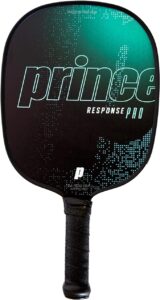
The Prince Response Pro pickleball paddle is a great choice for players who prefer a lighter paddle.
Weighing only 6.9-7.3 ounces, this paddle is easy to maneuver and provides a comfortable grip. It is one of the lightest pickleball paddles on the market. The paddle has a large sweet spot, which makes it easier to hit the ball with precision.
It also has a fiberglass face and a polypropylene core, which provides a good balance of power and control.
| Feature | Specification |
|---|---|
| Core Material | Polymer Honeycomb |
| Face Material | UV Coated Fiberglass |
| Weight | Lightweight (6.9-7.3oz) |
| Length | 15 3/4″ |
| Width | 8 1/4″ |
| Grip Size | Standard (4 3/8″) |
| Handle Length | 5 1/2″ |
| Sweet Spot | Large |
| Edge Guard | Slim |
| USAPA Approval | Yes |
| Available Colors | Camo Green, Red, Seafoam, Simone Jardim Black, Simone Jardim Blue, Simone Jardim Pink |
| Swing Weight | Moderate |
| Swing Speed | Medium-fast |
ProKennex Pro Flight
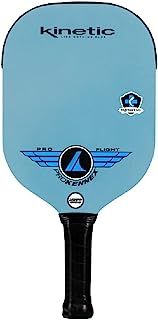
The ProKennex Pro Flight is another excellent lightweight pickleball paddle that I recommend and one of the lightest pickleball paddles.
Weighing only 7.1 ounces, this paddle is designed for players who want to improve their speed and agility on the court. The paddle has a unique air-o-foil honeycomb core, which provides a great balance of power and control. The paddle also has a graphite face, which gives it a sleek and stylish look.
This paddle is one of the paddles the Senior Pro women use on tour.
| Feature | Specification |
|---|---|
| Weight | 7.3 – 7.6 oz. |
| Shape | Traditional |
| Surface | Toray T700 Carbon Fiber with Diamond Frost coating |
| Core | Cloud Cell polypropylene honeycomb |
| Frame | Kinetic System Technology with Carbon Casing |
| Edge Guard | Replaceable Air-O-Guard |
| Grip Size | 4 in. |
| Grip Length | 4 7/8 in. |
| Paddle Length | 15.43 in. |
| Paddle Width | 7.6 in. |
| Paddle Thickness | 11 mm |
| Swing Weight | 320 grams |
| Swing Speed | 100 mph |
Engage Pursuit MX
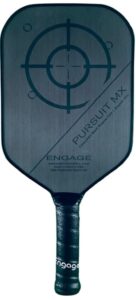
The Engage Pursuit MX is a great lightweight pickleball paddle that is designed for players who want to improve their accuracy and control.
Weighing only 7.2 ounces, this paddle has a unique design that provides a great balance of power and control. The paddle has a carbon fiber face and a polymer core, which provides a good amount of pop and a comfortable grip.
The paddle also has a large sweet spot, which makes it easier to hit the ball with precision.
This is a favorite of the Men and Women Pros on Tour.
| Feature | Specification |
|---|---|
| Shape | MX (16.5″ x 7.5″) with a 5.75″ handle length |
| Core | Proprietary Polymer Composite (Control Pro ‘Black’ Technology) |
| Skin | Raw Toray T700 Carbon Fiber with Next Generation Inner Application Layer |
| Grip Circumference | 4 1/4″ |
| Weight | 7.9 – 8.3 oz (Standard) / 7.5 – 7.8 oz (LITE weight) |
| Thickness | 1/2″ thick core |
| Noise Level | Optimized to pass most stringent community noise requirements |
| Vibration Control | Yes |
| USAPA Approval | Yes |
| Swing Speed | 25-30 mph |
| Swing Weight | 110-120 g-cm^2 |
Paddletek Bantam TS-5
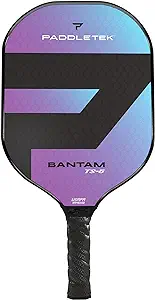
The Paddletek Bantam TS-5 is a great lightweight pickleball paddle that is designed for players who want to improve their speed and agility on the court. Weighing only 7.3 ounces, this paddle has a unique design that provides a great balance of power and control.
The paddle has a composite face and a polymer core, which provides a good amount of pop and a comfortable grip. The paddle also has a large sweet spot, which makes it easier to hit the ball with precision.
In conclusion, these lightweight pickleball paddles are great for players who want to improve their game and gain a competitive edge on the court. Each paddle has its unique features and benefits, so it’s important to choose the one that suits your playing style and preferences.
This is the paddle that Anna Leigh Waters uses.
| Feature | Specification |
|---|---|
| Shape | Standard full-sized paddle |
| Core | Bantam PolyCore |
| Skin | Textured Fiberglass Epoxy Hybrid |
| Grip Circumference | 4 1/4″ |
| Weight | 7 – 7.5 oz |
| Thickness | 12.7 mm |
| Noise Level | Moderate |
| Vibration Control | Moderate |
| USAPA Approval | Yes |
| Power Rating | 7.5 / 10 |
| Control Rating | 8 / 10 |
| Forgiveness Rating | 7.5 / 10 |
| Swing Speed | 27-32 mph |
| Swing Weight | 115-125 g-cm^2 |
Frequently Asked Questions
What factors should I consider when choosing a lightweight pickleball paddle?
When choosing a lightweight pickleball paddle, there are several factors that you should consider. First, consider the material of the paddle. Lightweight paddles are usually made of materials such as graphite, carbon fiber, or fiberglass. These materials are known for their durability and lightweight properties.
Second, think about the shape and size of the paddle. The shape of a paddle can affect how it feels in your hand and how it performs on the court. The size of the paddle can also affect your gameplay, as larger paddles can provide more power and control.
Lastly, consider the grip size of the paddle. The grip size can affect how comfortable the paddle feels in your hand and can also affect the weight of the paddle.
What are some of the best lightweight pickleball paddles on the market?
Some of the best lightweight pickleball paddles on the market include the Selkirk Prime S2 Paddle, Onix Sub-Zero Paddle, and Gamma Compass Paddle. These paddles are known for their lightweight design and exceptional performance.
How does the weight of a pickleball paddle affect gameplay?
The weight of a pickleball paddle can affect gameplay in several ways. A lighter paddle can provide greater control and maneuverability, making it easier to hit precise shots. However, a heavier paddle can provide more power, making it easier to hit harder shots.
What are the benefits of using a midweight pickleball paddle?
Using a midweight pickleball paddle can provide a balance between control and power. These paddles are typically heavier than lightweight paddles but lighter than heavy paddles. They can provide a good balance of control and power, making them a good choice for players who want a versatile paddle.
What are some of the top brands that offer lightweight pickleball paddles?
Some of the top brands that offer lightweight pickleball paddles include Selkirk, Onix, Gamma, ProLite, and HEAD. These brands are known for their high-quality paddles that combine lightweight design with exceptional performance.
Can a small grip size affect the weight of a pickleball paddle?
A small grip size can affect the weight of a pickleball paddle. A smaller grip size will typically result in a lighter paddle, while a larger grip size will result in a heavier paddle. It is important to choose a grip size that feels comfortable in your hand while also considering the weight of the paddle.


